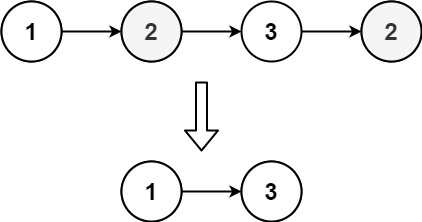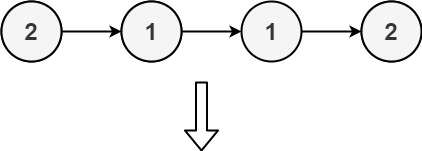Welcome to Subscribe On Youtube
Formatted question description: https://leetcode.ca/all/1836.html
1836. Remove Duplicates From an Unsorted Linked List
Level
Medium
Description
Given the head of a linked list, find all the values that appear more than once in the list and delete the nodes that have any of those values.
Return the linked list after the deletions.
Example 1:

Input: head = [1,2,3,2]
Output: [1,3]
Explanation: 2 appears twice in the linked list, so all 2’s should be deleted. After deleting all 2’s, we are left with [1,3].
Example 2:

Input: head = [2,1,1,2]
Output: []
Explanation: 2 and 1 both appear twice. All the elements should be deleted.
Example 3:

Input: head = [3,2,2,1,3,2,4]
Output: [1,4]
Explanation: 3 appears twice and 2 appears three times. After deleting all 3’s and 2’s, we are left with [1,4].
Constraints:
- The number of nodes in the list is in the range
[1, 10^5] 1 <= Node.val <= 10^5
Solution
Loop over the linked list and use a hash map to store each value’s number of occurrences. Then create a dummy head before head. Starting from the dummy head, loop over the linked list again and remove the nodes that have values with occurrences greater than 1. Finally, return the node right after the dummy head.
-
/** * Definition for singly-linked list. * public class ListNode { * int val; * ListNode next; * ListNode() {} * ListNode(int val) { this.val = val; } * ListNode(int val, ListNode next) { this.val = val; this.next = next; } * } */ class Solution { public ListNode deleteDuplicatesUnsorted(ListNode head) { Map<Integer, Integer> map = new HashMap<Integer, Integer>(); ListNode temp = head; while (temp != null) { int val = temp.val; map.put(val, map.getOrDefault(val, 0) + 1); temp = temp.next; } ListNode dummyHead = new ListNode(0); dummyHead.next = head; temp = dummyHead; while (temp.next != null) { ListNode next = temp.next; int nextVal = next.val; if (map.get(nextVal) > 1) temp.next = next.next; else temp = temp.next; } return dummyHead.next; } } ############ /** * Definition for singly-linked list. * public class ListNode { * int val; * ListNode next; * ListNode() {} * ListNode(int val) { this.val = val; } * ListNode(int val, ListNode next) { this.val = val; this.next = next; } * } */ class Solution { public ListNode deleteDuplicatesUnsorted(ListNode head) { Map<Integer, Integer> cnt = new HashMap<>(); for (ListNode cur = head; cur != null; cur = cur.next) { cnt.put(cur.val, cnt.getOrDefault(cur.val, 0) + 1); } ListNode dummy = new ListNode(0, head); for (ListNode pre = dummy, cur = head; cur != null; cur = cur.next) { if (cnt.get(cur.val) > 1) { pre.next = cur.next; } else { pre = cur; } } return dummy.next; } } -
// OJ: https://leetcode.com/problems/remove-duplicates-from-an-unsorted-linked-list/ // Time: O(N) // Space: O(N) class Solution { public: ListNode* deleteDuplicatesUnsorted(ListNode* head) { unordered_map<int, int> cnt; for (auto p = head; p; p = p->next) cnt[p->val]++; ListNode dummy, *tail = &dummy; while (head) { auto node = head; head = head->next; if (cnt[node->val] == 1) { tail->next = node; tail = node; }// else delete node; // If I uncomment this code, I'll get heap-use-after-free error. Why? } tail->next = nullptr; return dummy.next; } }; -
# Definition for singly-linked list. # class ListNode: # def __init__(self, val=0, next=None): # self.val = val # self.next = next class Solution: def deleteDuplicatesUnsorted(self, head: ListNode) -> ListNode: cnt = Counter() cur = head while cur: cnt[cur.val] += 1 cur = cur.next dummy = ListNode(0, head) pre, cur = dummy, head while cur: if cnt[cur.val] > 1: pre.next = cur.next else: pre = cur cur = cur.next return dummy.next -
/** * Definition for singly-linked list. * type ListNode struct { * Val int * Next *ListNode * } */ func deleteDuplicatesUnsorted(head *ListNode) *ListNode { cnt := map[int]int{} for cur := head; cur != nil; cur = cur.Next { cnt[cur.Val]++ } dummy := &ListNode{0, head} for pre, cur := dummy, head; cur != nil; cur = cur.Next { if cnt[cur.Val] > 1 { pre.Next = cur.Next } else { pre = cur } } return dummy.Next } -
/** * Definition for singly-linked list. * class ListNode { * val: number * next: ListNode | null * constructor(val?: number, next?: ListNode | null) { * this.val = (val===undefined ? 0 : val) * this.next = (next===undefined ? null : next) * } * } */ function deleteDuplicatesUnsorted(head: ListNode | null): ListNode | null { const cnt: Map<number, number> = new Map(); for (let cur = head; cur; cur = cur.next) { const x = cur.val; cnt.set(x, (cnt.get(x) ?? 0) + 1); } const dummy = new ListNode(0, head); for (let pre = dummy, cur = head; cur; cur = cur.next) { if (cnt.get(cur.val)! > 1) { pre.next = cur.next; } else { pre = cur; } } return dummy.next; }